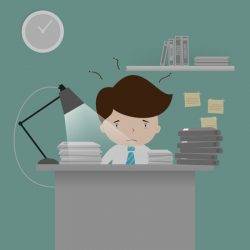October 31, 2016
Wellbeing threat for UK workers who don’t see daylight in winter 0
The customary debate over putting the clocks back has come and gone, as has the average workers chances of seeing any daylight until the early spring, for according to new research, the average office worker will now only be seeing daylight for less than an hour (52 minutes) a week. Nine in 10 rarely glimpse daylight during the winter months as they arrive at and leave work in the dark, according to a poll of 2,000 workers by Get More Vitamin Drinks. The average person will only leave the building for a total of 52 minutes during the week, although two-thirds admit there are at least two weeks in every month where they don’t spend any time outside at all. Unsurprisingly, just under half of office workers believe their work suffers as a direct result of the lack of sunlight – with productivity dropping rapidly from around 2pm. The study shows two thirds of office workers will start finding it difficult to concentrate by the early hours of the afternoon in winter as a direct result of being stuck inside.
A further four in 10 find themselves day dreaming if they’ve been sat at the desk most of the day, while 24 per cent start to make lots of mistakes. A fifth of workers find it increasingly difficult to pay attention during meetings as the day progresses, while 43 per cent get side-tracked easily. Thirteen per cent of people polled admitted they often feel the need to have a little sleep at their desks during the winter months. One in 10 people are unable to answer the phone coherently if they haven’t had enough sunlight, while seven per cent have been known to send emails to the wrong people.
And a lack of access to the outdoors does seem to affect people’s overall health and well-being on a day to day basis. The findings indicate people are more likely to feel tired and lethargic without sunlight – 36 per cent will also feel grumpy and 34 per cent feel unmotivated. Sixteen per cent don’t feel able to function properly if they haven’t moved from the desk all day, while 28 per cent say their mood switches from happy to depressed if they have to stay inside.
But despite knowing winter is all about shorter days and a lack of light, two thirds of office workers are LESS likely to try and take a lunch break in the colder season. More than eight in 10 people don’t like to go out at lunch if its too cold, and 42 per cent find the outdoors too dark and depressing.
A further 31 per cent of people polled prefer to bring in a warm lunch and simply eat at their desk as they continue working. In addition to the average working week, 51 per cent of adults claim there are some weekends during winter where they don’t leave the house either.
As such, an incredibly 55 per cent of people reckon they suffer from the ‘winter blues’, and 73 per cent don’t feel particularly motivated to do anything at this time. Cycling, running, walking to and from work and exercise in general are all likely to wane during the winter months. Instead, UK workers will eat more food, drink more alcohol and lead an altogether unhealthier lifestyle.
A spokesman for Get More Vitamin Drinks said: “During the winter months many people will leave for the office before the sun comes up around 7:45am and leave after it goes down at about 4pm in the afternoon.
“As such, the only opportunity people get to enjoy fresh air is during a lunch break – and that’s only if they have time and inclination to take one.
“Unfortunately this study seems to indicate that even when people do have the time to take a lunch, the weather and gloomy outlook means people can’t be bothered to go outdoors to stretch their legs. Afternoons are often therefore spent with people feeling lethargic and unproductive.”

























